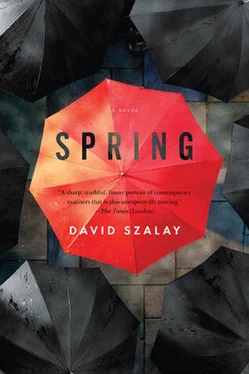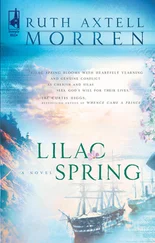She filled in the forms and set up two new direct debits—a total of £10 a month. And just that day she and her mother had added a thousand times that to the strong force. (And what was that, if not a mammalian mother single-mindedly providing for her young? The house in West Kensington, with its hundred and ten per cent mortgage, its wealthy tenants, was intended as a sort of trust fund for Katherine and Marc.) Yes, it was hopeless. Nevertheless, she went to the pillar box on Essex Road and posted the forms. She did not do it thinking it would make a difference. It was just her way of saying that she knew what she was doing, she understood, she felt terrible. But she wouldn’t stop doing it. She just didn’t want to enough.
Setting off the very next morning to add another £10,000 to the strong force was, however, too much. As she switched off the engine, she lowered her head. Tears fell onto the steering wheel.
‘Darling?’ Philippa said. ‘What is it?’
And of course it wasn’t just the poor, puzzled species being steadily shunted into oblivion, being shunted out of existence without ever understanding what was happening or why. (And they would do the same to us. We were just doing what any animal would.) It wasn’t just the hopelessness of that situation. That was there all the time. It was a much more personal hopelessness, of which that was nothing more than an echo. The love was dead. It was dead. She did not love him any more. The terrible thing was she did not love him any more.
*
It was still those memories. The hotel that week in October. The tambour of her heart. The flat in Battersea that first night. The lift in the morning—‘I’m in love with you.’ The experience had acquired a definitive quality. It had turned into a definition of what love was. She had thought, that October— Yes, this is what people mean when they talk about love. She had previously been in love once or twice. Fraser was not the first. And those experiences were not nothing. They were still important to her. In some significant way, though, they were lesser. With them, she had not felt with the same heart-walloping surety that this was what people meant when they talked about love. There were moments there which seemed qualitatively different from everything else in her life. They would be the moments she thought of at the end. They would be the things she thought of at the end of her life. In a sense, they were her life. Specific moments, mostly from that first week, or the first few weeks, or the first few months. When she tried to write them down, however, they had none of their force. Writing them down, trying to transcribe them, made them seem mundane, normal. Nothing special. She stopped trying. What was the point anyway? Only that she wrote down everything else, so it seemed strange that the most important, the most significant things were not there.
It was still those memories. It seemed impossible that any other man would ever be able to lessen their importance. Even if she were to have a similar experience with someone else in the future, which was not impossible, what it would lack would be the feeling that it was unique, that it was the final word. It would be hard to have that kind of faith in any feeling in the future. When she said, ‘The love is dead,’ she had a terrible sense that what she was in fact saying was, ‘For me, love is dead.’ She wondered whether her experience of this was unusual, or whether it had just happened to her unusually late in life. (She had started sleeping with men unusually late in life, after all, not until she was twenty.) Did most people have an experience like this, she wondered, when they were much younger—in their early twenties, even in their teens?
Those memories.
She was unable to escape the sense that the most intense love of her life was now in the past. The love was in the past. The love itself was in the past—she no longer felt it, not even in a lesser, hugely watered-down form. She no longer felt it. It no longer existed. In Edinburgh she had wondered why she had once loved Fraser. It didn’t even seem to make sense any more.
The love is dead…
For me, love is dead…
She had perhaps known, the whole time she thought she wanted to stop loving Fraser, that this was the situation she would find herself in if she ever did. It seemed she had staked everything on him, and now she had nothing left for anyone else. Perhaps that was why she never truly did want to stop loving Fraser. And it had been easy—it had been easy not to stop loving him—when he wasn’t there. She thought of the words of that poem—
In the mind ever burning;
Never sick, never old, never dead,
From itself never turning…
Yes, something like that. Except it does have to turn from itself when its object finally is sitting there with sad eyes in a silly polo neck that misguidedly flaunts his paunch…
Thoughts like that tended to make her question everything. Tended to undermine the very idea of things. That was indeed the whole problem perhaps.
More words, more poetry— Never such innocence again …
And still more— After such knowledge, what forgiveness?
Freddy at school was an out-and-out weirdo. An insolently effortless top-setter, a heavy smoker, a purveyor of particularly extreme pornography—those tattered scraps of flesh-toned images—he was, with his halo of frizzy hair and plump putto’s face, a frightening outsider to many of the others. To many of the teachers too. A hand up in the middle of the French lesson. Mr Ellis is the terrified herbivore at the front near the whiteboard. ‘Sir?’ ‘Yes, Munt?’ (With a weak smile.) ‘Does wanking make you weak, sir?’ Little explosions of laughter from all over the room. Ellis obviously mortified, lady-faced, fully unable to deal with the situation. Does wanking make you weak, sir? Ostensibly—and this was very much the tone in which it was asked—it was an innocent appeal for information from an older, more experienced man. That, however, would be to miss the merciless overtone, enormously present that morning in the language school— You, Mr Ellis, does wanking make you weak? Is it wanking that makes you so weak, sir? Are you so weak, sir, because of all the wanking you do?
James was there for that incident, quietly reading a newspaper at a sunny desk near the windows. He was in the top set in French, and only in French. His father lived in France and he spent four months of the year there.
Mr Ellis might have stammered something.
More probably he just froze for a few seconds, and then with unseeing eyes kept murmuring the prepared text of the lesson as if nothing had happened.
Freddy was neither popular nor unpopular. For one thing, he didn’t do sport, which in itself placed him so far out of the mainstream as to be practically invisible. (James did do sport. He was in the second XV, which had a certain slackerish cachet, and was one of the stars of the hockey first XI, and on the tennis team too.) As for Freddy, he had once fannied about with the other anaemic four-eyed specimens on their twig-like legs, milky white thighs signally failing to fill shorts—and there was absolutely nothing to be said, in terms of social status, for the fourth XI, the fifth XV. They were for malcos and flids. They were for spastics. The slackerish cachet, such as it was, ended with the second team.
Freddy’s liberation from sport was the piano. While this was not particularly helpful for his image either, it was infinitely preferable to stumbling around in the mud on that polder of playing fields west of Hammersmith with someone like Mr Ellis timidly peeping the whistle on Tuesday, Thursday and Saturday afternoons. (The staff room had its own sports hierarchy, which, while it exerted itself more subtly in social terms, more or less exactly mirrored that of the pupils.) So, the piano. The long, polished Steinway in the main hall of the music school. Mr Harris, the head of music, said Freddy was a ‘wunderkind’, and finally he persuaded the other Mr Harris—this one was head of sport, a far more exalted figure, a figure of papal mystique—to let Freddy off sport totally and permanently, so long as he instead spent the time practising the piano. This indulgence—which was unprecedented—massively enhanced Freddy’s status as a louchely unusual outsider. Indeed, with no further involvement in sport, he no longer seemed to be fully or properly part of the school. He spent most of his time in the music school—it looked like a small rococo theatre in an isolated part of the grounds—playing the piano and smoking. Mr Harris let him smoke in the music school; it was his own little kingdom, where all sorts of strange practices obtained. For instance, Freddy was on first-name terms with him—‘Morning, Mike’—as he was with most of the other tweed jackets and bluestockings of the music staff. At the age of fourteen, he took Grade Eight, and started to work his way through the semi-professional qualifications that followed it. The life of a professional musician—even some sort of star—seemed there for the taking.
Читать дальше












